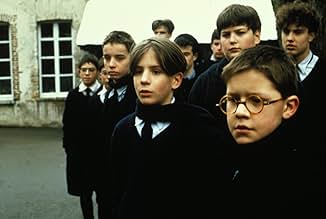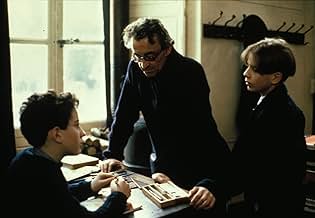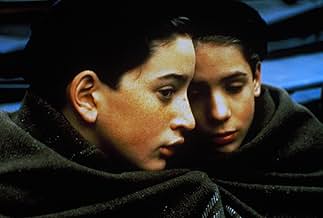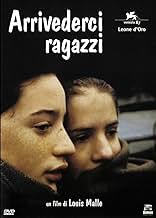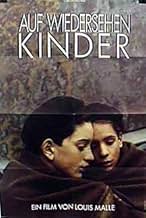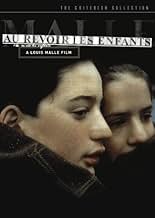Ein von Priestern geleitetes französisches Internat scheint inmitten des Zweiten Weltkriegs ein sicherer Zufluchtsort zu sein, bis ein neuer Schüler dazukommt. Er teilt das Zimmer mit dem be... Alles lesenEin von Priestern geleitetes französisches Internat scheint inmitten des Zweiten Weltkriegs ein sicherer Zufluchtsort zu sein, bis ein neuer Schüler dazukommt. Er teilt das Zimmer mit dem besten Schüler seiner Klasse. Zunächst Rivalen, verbindet die Zimmergenossen bald eine enge ... Alles lesenEin von Priestern geleitetes französisches Internat scheint inmitten des Zweiten Weltkriegs ein sicherer Zufluchtsort zu sein, bis ein neuer Schüler dazukommt. Er teilt das Zimmer mit dem besten Schüler seiner Klasse. Zunächst Rivalen, verbindet die Zimmergenossen bald eine enge Freundschaft und ein Geheimnis.
- Für 2 Oscars nominiert
- 28 Gewinne & 12 Nominierungen insgesamt
- François Quentin
- (as Stanislas Carré De Malberg)
- Moreau
- (as Luc Étienne)
Empfohlene Bewertungen
Part of what makes this autobiographical film from Louis Malle so powerful is that a big portion of its coming of age material is universal. In a Catholic boarding school we see hazing and random bullying while ineffectual headmasters look the other way, bedwetting, reading after hours, playground battles, curiosity about girls, and the kind of childhood events that get remembered for life, like getting lost in the woods. In other words, it's just boys trying to get through the difficulties of growing up, and really could be any group of boys, at any time.
But of course this isn't just any period, it's occupied France during WWII, and while the school full of affluent kids seems mostly insulated from that, danger lurks. Three new boys who have been admitted and given new names are secretly Jews, a fact which gradually becomes known by Julien, one of the smarter students (Gaspard Manesse, playing the young Malle). He has a rivalry and a friendship with one of the new boys (played soulfully by Raphaël Fejtö), and the nuances of their relationship not only felt authentic, but it made it hard to know how the film would play out.
I love the dimensions of the film, including the differing Catholic responses to the Jewish issue in Vichy France - some good, some bad. There is also an axis of rich/poor, and I loved the sermon where the priest shocks the visiting parents by criticizing the behavior of the wealthy. Lastly, the use of the Chaplin film 'The Immigrant' (1917) within the film is pitch perfect, and a masterful touch.
The two main characters, Julien Quentin and Jean Bonnet, are beautifully portrayed by two very capable and talented young actors. The supporting cast is equally impressive. The film is directed with a touch of genius, and holds its own when compared to another motion picture masterpiece, To Kill a Mockingbird.
A particularly effective scene is in the restaurant. There are some Wehrmacht officers at a table, but they keep to themselves. Then the Milice enters and orders a Jewish patron out of the restaurant. The Wehrmacht officers then order the Milice to leave. This emphasizes not only the role of the Vichy government, but also the role of the collaborators in every country that Germany occupied.
I haven't seen all of Malle's movies, but this is probably the best of his movies that I've seen. The final scene has to be one of the most chilling in cinema history. I recommend the movie.
Those words still linger with me now and has made me realise that perhaps a lot of the movie-going public these days feed on the latest sfx pyrotechnics, more ingenious ways of abstract killings, lots of needless sex and not letting a good intelligent story get in the way.
Films like Les Enfants are going to be even more difficult to track down if Hollywood and some of the European studios opt for the fast Buck route to riches.
Les Enfant is a truly wonderful & yet harrowing account of life in a Catholic boys boarding school during the dying embers of the Nazi occupation of France in WW2. One of the new boys happens to be Jewish but the headmaster chooses to keep such identities covert while still offering him sanctuary and an education in spite of all the risks he takes.
To be fair I know little of Louis Malle previous to this film, but I think he must have poured his life's soul into writing & directing Les Enfant.
No detail, harrowing or otherwise, is spared; we see so much beauty amongst the horrors of occupation & collaboration; but also the blossoming relationship between the two lead boys and how initial envy & hatred of the Jew is somewhat diluted by the realities that this is no infantile school game but that life and death for the Jewish boy hangs by a thread if anyone at the school should reveal his true identity.
The final moments are perhaps one of the most sad & dramatic scenes I have ever seen. These days a lot of people would be waiting for some great heroic entrance from a big movie star to sort out all the misery and leave us with a reassurance that "it really wasn't all that bad back then was it".
But there are no heroes at the end of this movie, at least not the kind of heroes Hollywood serves up. The boys in this film are the true heroes right to the very end, primarily for their spirit of humanity in the face of impossible odds.
This is the hard reality of war amongst children growing up not only in the face of their own adolescence (and all the problems that serves), but also with the dark fingered claw of Nazism hanging menacingly like the the Scythe of the Grim Reaper.
This film will move you in so many directions and will hopefully bring you back down to earth from the current Hollywood shallow circus of pap & style-over-content.
Its a difficult film to track down, and the reason for this can be attributed to the first paragraph of this review.
*****/*****
Wusstest du schon
- WissenswertesBased on an incident from Louis Malle's own youth. Julien is modeled after Malle.
- PatzerWhen hiking, Julien asks what day it is and is told that it's Thursday, January 17th, 1944. That date was actually a Monday.
- Crazy CreditsPour Cuotemoc, Justine et Chloé. (opening credits)
Top-Auswahl
- How long is Au Revoir les Enfants?Powered by Alexa
Details
- Erscheinungsdatum
- Herkunftsländer
- Offizieller Standort
- Sprachen
- Auch bekannt als
- Au Revoir les Enfants
- Drehorte
- Produktionsfirmen
- Weitere beteiligte Unternehmen bei IMDbPro anzeigen
Box Office
- Bruttoertrag in den USA und Kanada
- 4.542.825 $
- Weltweiter Bruttoertrag
- 4.575.613 $
- Laufzeit
- 1 Std. 44 Min.(104 min)
- Farbe
- Sound-Mix
- Seitenverhältnis
- 1.66 : 1

![Bande-annonce [VOST] ansehen](https://m.media-amazon.com/images/M/MV5BZDlkMTI5OTgtNmU4My00MzRjLWFkNzMtYmMyMDlhNjQ2OTFmXkEyXkFqcGdeQXRyYW5zY29kZS13b3JrZmxvdw@@._V1_QL75_UX500_CR0)
